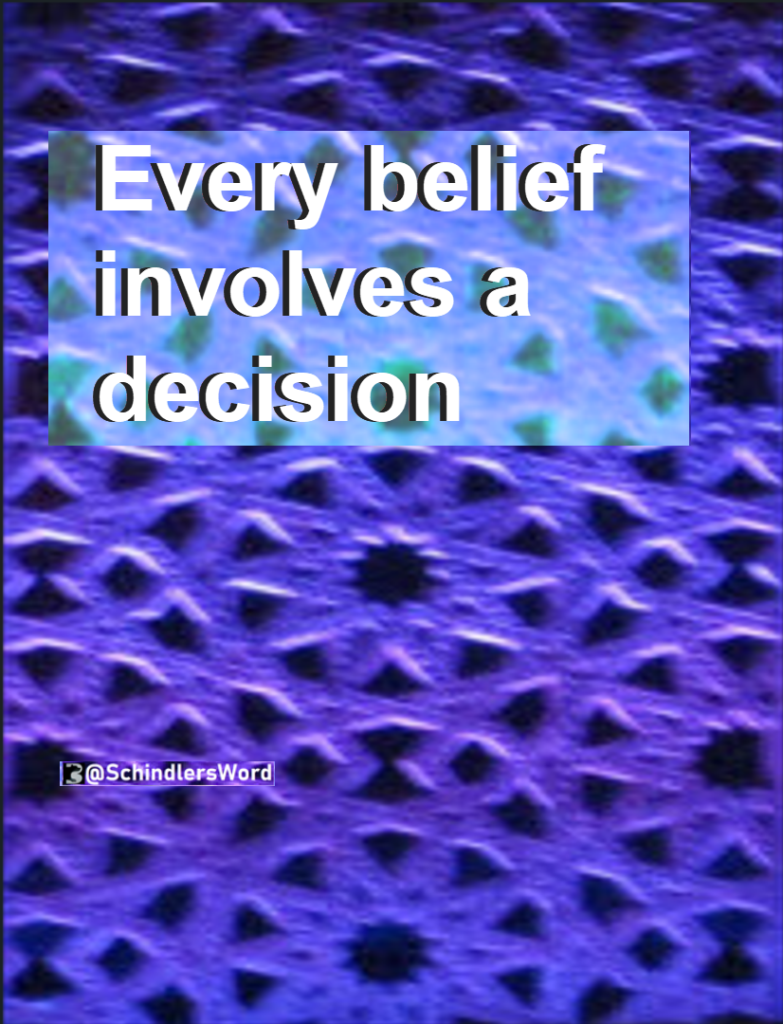
Though everything a word-user can believe — also known as choices — is more than anyone can manage, it involves a decision only the word-user in question can make.
To name just a few of the choices word-users can believe…
- Stories that happened. Example: The story of words.
- Stories that never happened. Example: The story of Santa Claus.
- Words that happen. Example: Sun.
- Words that never happened. Example: Life.
- Word-users that exist or existed. Example: Anyone you know that exists or has existed (taking into consideration that know and belief are different for a reason).
- Fictional characters imagined by someone you know exists or has existed. Example: Mickey Mouse, Catwoman, James Bond, and gods.
Every belief involves a decision
Everything a word-user experiences is a perspective, not the truth. Which explains why it’s to each their own.
Which perspective to believe is a question of experience, character, and preferences — to each their own again. And every belief involves a decision, again to each their own for nobody else can make the decision for you.
Words
Which word to believe, or not, is no exception. It involves a decision. However, words come with an extra challenge.
The majority of word-users can’t tell the difference between a word that happened and a word that didn’t.
Stories
What’s true for words also applies to stories.
The majority of word-users can’t tell the difference between a story that happened and a story that didn’t.
For the majority of word-users, all that matters is the story is true.
In the world of words
Every time I believe anything, I get punched in the face.
The last time this happened to me is when I believed fictional figures — such as gods, Superwoman, Batman, and Minnie Mouse, to name a few — could talk.
As every word-user knows, nothing could be farther from the truth.
Gods, Miss Marple, James Bond, and Mickey Mouse, to name a few, don’t talk. They couldn’t if they tried for fictional characters never spent a day at school where words are taught.
The fictional characters words are spoken by actors that spent years at school so they could talk on the fictional character’s behalf.
The difference between the many and the few
The difference between the many word-users and the few is only a few invest some energy, time, and money into wondering why the past is what it is.
These few word-users are disliked, hated, or in some places put to death by the many word-users that have decided to believe the past is in a book.
In the wordless world
The wordless sun, energy, fire, air, earth, water, atoms, cells, plants, mountains, valleys, oceans, stars, moons and wordless animals, to name a few, never spent a day at school.
They couldn’t if they tried for most of them aren’t equipped with a brain.
Which explains why you cannot convince water or lions to give you water or meat by promising them limitless water or meat after death in water or lion heaven.
The difference between the wordful and the wordless
The wordless that never spent a day at school have co-existed in harmony since 13.8 billion years ago if not beyond.
The wordful that built and attended school have been at war with each other and everything else since the invention of words 13,750 years ago.
13,750 years that the wordful have been at war is a mere 0.0001% of the 13.8 billion years that the wordless have co-existed in perfect harmony.
Makes you wonder what schools and words are for, doesn’t it?
PS
Know someone who might like this? Repost & share it with them.
PPS
When you sign up for my weekly newsletter, you’ll learn once a week — every Tuesday — how to experience the journey of your dreams supported by work you enjoy.
